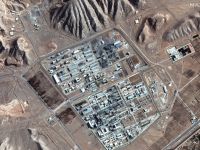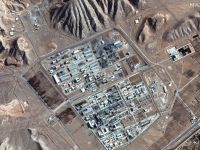“Things are very bad here,” says curator Amanda Abi Khalil, “but very calm.”
These days, you might be envious of anyone invited to spend five weeks in a forest village on the coast of Sao Paulo state. As Lebanon descends into the winter of the worst year in recent memory, who wouldn’t jump at a working holiday in springtime Brazil?
That’s been the premise of “Make Yourself at Home,” a residency for Lebanese artists organized by Abi Khalil’s Temporary Art Platform, in partnership with Brazil’s Kaaysa Art Residency.
This tropical escape, which wraps Saturday (Nov. 14), has had a caveat or two.
First, Bolsonaro’s Brazil has reported over 5.5 million cases of COVID-19 recently. These numbers are bested by those of Modi’s India (8.5 million) and Trump’s USA (over 10 million), but Brazil still has the second-highest number of recorded deaths, over 160,000 of them.
Then there’s that other thing. To participate in this residency, you must have had your life and work seriously upended by the Beirut Port blast of Aug. 4.
TAP launched its residency program for international and local artists in 2014, the first three being located in different Lebanese villages. The platform’s first overseas residency, “Make Yourself at Home” was conceived in 2017 but the port explosion radically altered its priorities and the artists invited to participate.
“Giving these artists a place to live was no longer an accessory,” Abi Khalil recalls in the residency’s final days. “It was a necessity.”
This is how “Make Yourself at Home” acquired the second part of its name: “Radical Care and Hospitality.”
By now the term “hospitality” has been emblazoned upon late capitalism’s tertiary sector. Whether it’s supper at that little place around the corner, or the luxurious exclusivity offered by an archipelago of discreet haute touristic enclaves – forms of commerical hospitality have been more or less compromised by the COVID-19 pandemic.
“Hospitality” also has resonance in these days of mass migration compelled by armed conflict, climate change, and conflicts exacerbated by environmental disaster. Internment camps and criminality, bureaucracy, despair and opportunity offer an ironic counterpoint to the hospitality trade.
With its handful of artists, eroded by a year of economic collapse and traumatized by the ammonium nitrate explosion, “Make Yourself at Home” has briefly occupied a space between these two extremes.
“We’re considering each artist not only as an artist but as a person who needs to rest,” Nour Osseiran explained. “It’s about giving them time and support, whether it’s curatorial or otherwise.”
Osseiran has taken part in “Make Yourself at Home” in two capacities – as a TAP co-coordinator and a participating artist. She was joined by visual artists Lara Tabet, Omar Mismar, Maxime Hourani and Betty Ketchedjian, filmmaker Panos Aprahamian and sound artist Nour Sokhon.
“We’re trying to navigate what it means to organize an artists’ residency and a relief residency,” Osseiran said. In the first week “we explored Boicucanga, the village we’re in. We got a sense of the geography and the feel of the place ... We cooked together. We eat together every day.”
As it’s a relief residency for artists, TAP was careful in its selection process. Abi Khalil says arts organizations affected by the port blast – Beirut Art Center, Beirut Art Residency, Ashkal Alwan, Zoukak, the Lebanese Academy of Fine Arts, Haven for Artists, Culture Resource and Marfa’ Gallery – recommended 32 artists.
Working from the criteria of diversity of voices and need, a selection committee reduced this number to the seven participants, but 15 of those approached had declined, saying they were in no shape for an artist residency.
“When I learned that artists had declined for psychological reasons,” Abi Khalil says, “I decided to make therapy available as part of the residency. The artists had access to Denise Portinari, who is a psychoanalyst and a curator, if they wanted it. Nothing was mandatory.”
Osseiran said that, in discussion, the artists have tended to feed off one another’s disparate practices and disciplines.
“The creative projects the group is undertaking [are] unfolding very organically,” she said. “The purpose of this program isn’t to demand more production from the artists.
“We’re welcoming collaborative approaches. There are a lot of ideas percolating among the artists, a lot of discussion. This time together is bringing up some interesting propositions on hospitality and care in times of crisis.”
Abi Khalil notes that, though some of the artists weren’t interested in working or discussing their work when they arrived, the weeks of community got them moving again.
“When Maxime [Hourani] arrived he just wanted to be left alone,” she says. “By week three he was ready to start on a really ambitious project.
“Omar [Mismar] just finished an intervention, a mural. It shows a mosquito carrying a mosquito trap and reads ‘The revolution needs blood.’ Being eaten by mosquitos is something we’ve all shared these weeks.”
“I wanted to examine the notion of home,” photographer Betty Ketchedjian wrote via social media. “Especially now with the current state of our country and the increase of emigration, these questions arise – what is home? Can we build it elsewhere? Is it tied to the land, to the people? My time here is spent researching and exploring this idea.”
Filmmaker Panos Aprahamian told The Daily Star he’s devoted his residency to “AKA The Vanguard Outside of History,” the third installment in an experimental film project.
“I have been exploring hybrid cinematic works,” he wrote via social media. “With the first installment [‘Yabandjo,’ 2016], I explored what French filmmaker Jean Rouch [1917-2004] called ‘ethnographic fictions.’”
Aprahamian’s project reflects upon several genres – essay film, dystopian science-fiction, ethnographic film and nature documentary. He says “AKA The Vanguard” borrows its form from the traditions of documentary filmmaking and Masao Adachi’s landscape theory of cinema.
“The endeavor will both be a critique of the contemporary ‘post-truth’ media landscape,” he wrote, “and some form of tribute to Middle Eastern artists and filmmakers that have experimented with and requestioned the factual, the fictional, their differences and similarities ...
“For some of us, citizens of the Global South, indigenous people, and ethnic and sexual minorities, dystopian sci-fi horrors are not a future possibility but a historical reality.”
Sound artist Nour Sokhon reiterated other artists in welcoming an opportunity to discuss her work face to face with other human beings.
“More than anything, I feel this residency has provided an opportunity to somehow recalibrate my mind to process a lot of the things we were not really given the opportunity to process since last October,” Sokhon said via voice mail.
“Personally I came here with two commissioned works. They were delayed so I’m spending quite a lot of time doing that.
“We’re collaborating. We’re having conversations. We’re working on a collaborative film project with [Aprahamian]. We’re also doing some live performances. We collaborated with the Brazilian residents here for the film. Maxim [Hourani] and I collaborated with a Brazilian sound artist to do a performance.
“Simultaneously I’m constantly collecting recordings. I’m hearing a lot of relationships between some sounds I hear in Beirut and here -- the way announcements are made, when it comes to political parties and street vendors as well.”
Sokhon’s hearing was affected for nearly a month after the port blast and she says the residency has been a re-energizing experience.
“This will definitely give us the energy to fight back when we’re in Beirut, to send this energy to the other artists who, and other people that we know, to create more. I can definitely say my time here has inspired me and pushed me to keep pursuing my practice rather than give up.”
TAP’s “Make Yourself at Home: Radical Care and Hospitality” would have been impossible without the assistance of the Goethe institute Beirut, the Goethe institute Rio de Janeiro, the Brasilian consulate in Beirut and the generous support of individual donors
This article has been adapted from its original source.







